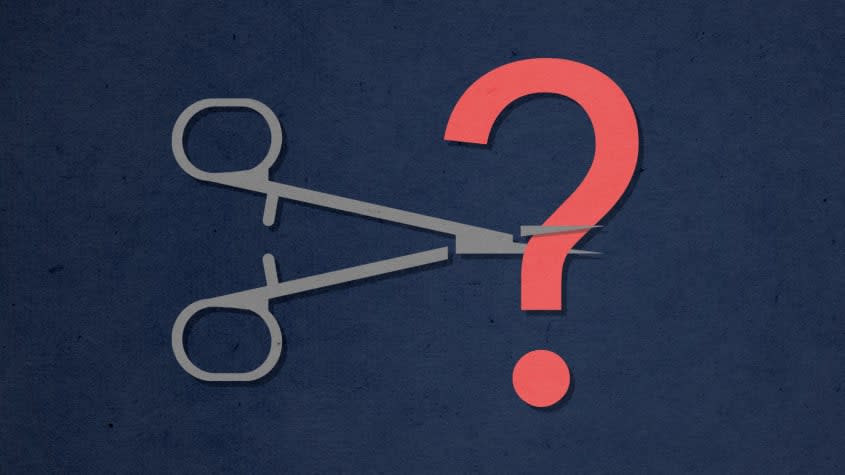Are vasectomies the future of family planning?

It takes two to tango. While the vast majority of discussion about the Supreme Court's ruling overturning abortion rights has naturally focused on women and their reproductive health, there are some men stepping forward to do their part to prevent unwanted pregnancies — by getting vasectomies.
Doctors across the country report an upswing in interest since a draft of the court's decision leaked in May. "I think that raised awareness about vasectomies as one of the options for permanent contraception and that led a lot of men and couples to seek them," Dr. Alex Shteynshlyuger told the New York Post. "There's a lot of interest."
Are vasectomies the way forward now that Roe v. Wade has been overturned? Here's everything you need to know:
Wait. Are American men really more interested in getting vasectomies?
Anecdotally, at least, it seems so. A doctor in Kansas City reported that his vasectomy consults had gone up 900 percent since the court's decision was announced. The health department in Laredo, Texas, has announced a similar uptick in interest. So have urologists in Idaho and Tampa Bay. A Nashville hot dog shop even offered free milkshakes upon proof of having undergone the procedure. One research company reported that searches for "where can I get a vasectomy?" spiked 850 percent after the ruling. But it's probably too early to know if this is really a trend or just something that the media is talking about a lot. Most urologists "book vasectomy consultations months in advance," Grace Deng reports for the Washingtonian, "so any consequences from Dobbs probably won't show up in their offices for a while."
Let's face it, though: Dudes haven't usually shouldered their fair share of the birth control burden. "Only about 6 percent of men in the U.S. rely on vasectomies to prevent pregnancy," Katie Notopoulos and Loren Cecil write for Buzzfeed News, while "about 18 percent of women on contraception use tubal ligation." (Men in Canada and the U.K. report far higher rates of getting sterilized.) Most estimates put the number of vasectomies at around 500,000 a year in the United States; meanwhile, the Guttmacher Institute reports that there were around 930,000 abortions in 2020. That's why some observers are skeptical about the recent surge in interest. "We might well celebrate men's recognition that birth control shouldn't be only a woman's concern," Kathleen Parker writes at The Washington Post, "but one can't help wondering where all this nobility has been hibernating the past 50 years."
So what's the case for getting a vasectomy?
Simple fairness, to start. It's not just that "female sterilization is twice as prevalent as vasectomy," The New York Times' Christina Caron observed in 2019 — it's also that "the fact that vasectomy is equally effective, less invasive, and carries a lower risk of complications" than tubal ligation. Men should step up, in other words, because it's usually easier for them to do so.
"For men who have already had children or know they don't want children, vasectomy is the safest, easiest, and most effective method of contraception," Jill Filipovic wrote last year in The Guardian. "It allows men more control over their own fertility. And it gives men with female partners an opportunity to more equally share in the work of planning their families." The reason they don't, though, is obvious: Men "don't bear the burden of pregnancy, and so there is far less incentive for them to take the lead in preventing it."
How do we get there?
Start with economics. While "there's no easy way to shift at least some of the contraceptive burden onto men," it would probably help if the cost of getting the procedure was reduced, says Kenny Torrella at Vox. The Affordable Care Act "requires insurance providers to fully cover 18 forms of contraception for women, including sterilization," but getting a vasectomy means "you'll probably have to pay at least some of it out of pocket." Torrella's suggestion is to make vasectomies free: "Making vasectomies more accessible and less expensive could shift some of the burden soon, at the moment when it is most needed."
But the biggest shift will probably be cultural. For a lot of men, virility equals masculinity. Many resist the procedure because of concerns that they'll suffer a sudden deficit in manliness, Deng observes. Doctors report that "some men think they'll have a 'loss of machismo'" even though "testosterone levels and erectile function should remain the same" after the procedure. Guys may not have much choice but to get over their anxieties, says MSNBC's Liz Plank. In "a world where women don't have a guaranteed constitutional right to access abortion and men don't have any laws regulating their bodies," she writes, "the burden of family planning will have to fall on them."
You may also like
What is Trump planning for 2024?
Assassin may have killed Abe as revenge against religious group that bankrupted his mother
5 scathing cartoons about controversial Supreme Court decisions

